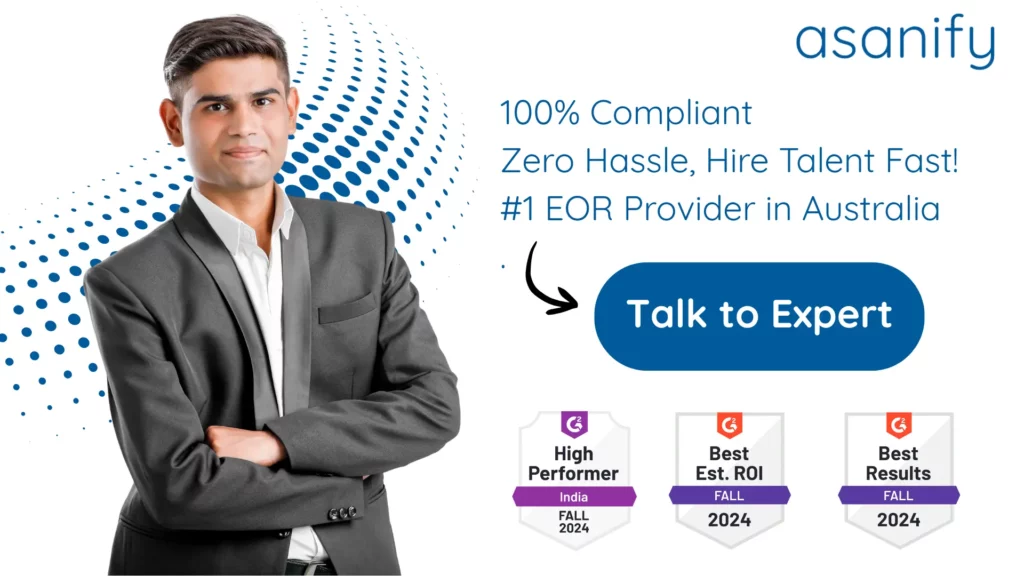Learn the steps, compliance rules, salary structures, and total costs to successfully hire remote team in Australia. This guide offers insights into the country’s employment landscape, in-demand skills, cost factors, and the advantages of using an Employer of Record (EOR).
Australia is emerging as a top destination for remote hiring in 2025. With an English-speaking workforce, a robust economy driven by technology, finance, healthcare, and resources, and strong business ties across the Asia-Pacific region, Australia offers global companies access to highly skilled talent. The country’s well-developed legal framework for remote work, combined with advanced infrastructure, makes it a compelling choice for building remote teams.
Table of Contents
- Overview of Australia for Remote Hiring
- Leading Industries Driving Employment in Australia
- Industry Landscape Snapshot
- Cost of Living for Remote Employees in Australia
- In-Demand Skills in Australia (2025)
- Key Legal Considerations for Hiring in Australia
- Payroll and Tax Compliance in Australia
- Using an EOR for Payroll and Compliance
- Salary Ranges for Remote Roles in Australia
- Steps to Hire a Remote Team in Australia
- Total Cost of Hiring Remote Employees in Australia
- How Can Asanify Simplify Hiring Remote Teams in Australia?
- Conclusion
- FAQs
Overview of Australia for Remote Hiring
Australia’s strategic location in the Asia-Pacific region allows companies to operate across multiple time zones. Its workforce is well-educated, tech-savvy, and adaptable, with high proficiency in English and growing interest in flexible work arrangements. The nation’s reliable internet connectivity, co-working hubs, and remote-friendly corporate culture enhance its attractiveness for global employers.
In addition, Australia’s stable political climate, transparent business regulations, and strong social welfare system give employers confidence in long-term workforce planning.
Leading Industries Driving Employment in Australia
Key industries driving demand in 2025 include:
- Technology and IT Services: Cloud computing, cybersecurity, and software development are rapidly expanding.
- Healthcare and Life Sciences: Strong demand for nurses, medical specialists, and biotech professionals.
- Finance and Banking: Sydney and Melbourne are leading financial hubs in the Asia-Pacific.
- Mining and Energy: Resource-rich states like Western Australia and Queensland continue to lead in mining and renewables.
- Education and Training: Australia’s higher education sector supports online learning and international student engagement.
These industries will remain competitive, offering diverse opportunities for remote professionals.
Industry Landscape Snapshot
Australia’s economy features a mix of multinational corporations, mid-sized enterprises, and startups particularly in fintech, AI, renewable energy, and health tech. Government incentives for innovation, R&D, and sustainability initiatives further drive economic growth. The country benefits from strong trade relationships across the Asia-Pacific, supporting export-led industries and international collaboration. A highly educated workforce and world-class universities contribute to a steady pipeline of skilled talent. Additionally, stable political conditions and transparent business regulations make Australia an attractive destination for long-term investment.
Remote work adoption has increased significantly post-pandemic, allowing companies to hire Australian talent without establishing a local office.

Cost of Living for Remote Employees in Australia
Australia has a relatively high cost of living compared to other Asia-Pacific countries, with variations across cities. Sydney and Melbourne are the most expensive, while Brisbane, Adelaide, and Hobart offer more affordable options.
| Expense Category | Typical Monthly Cost (AUD) | Notes |
| Housing | A$2,000 – A$3,200 | Higher in Sydney/Melbourne; lower in smaller cities |
| Utilities | A$200 – A$350 | Electricity, water, and gas |
| Transport | A$150 – A$220 | Public transport and fuel costs vary |
| Food & Groceries | A$500 – A$800 | Based on family size and dining habits |
| Leisure & Miscellaneous | A$250 – A$400 | Entertainment, gyms, personal expenses |
Despite higher living costs, Australian professionals bring high productivity and advanced skills to the global talent market.
In-Demand Skills in Australia (2025)
Top skills sought by global employers include:
- Technology: Software engineering, DevOps, cloud architecture
- Data Analytics: Data science, business intelligence, AI/ML
- Finance & Accounting: IFRS, risk management, investment analysis
- Healthcare: Clinical research, nursing, allied health services
- Customer Experience & Sales: English fluency, digital sales, CX strategy
These skills are critical for businesses targeting technology-driven and service-oriented sectors.
Suggested Read: Understanding Labour Laws in Australia: Key Regulations, Rights, and Compliance Tips
Key Legal Considerations for Hiring in Australia
Australian employment law is governed by the Fair Work Act and various state/territory regulations. Compliance covers contracts, workplace safety, taxation, and employee entitlements.
Employment Laws
- Governed federally by the Fair Work Act and supplemented by state/territory laws.
- National Employment Standards (NES) set minimum conditions.
- Anti-discrimination and workplace safety laws apply nationally.
Work Hours and Overtime
- Standard workweek: 38 hours for full-time employees.
- Overtime rates apply after standard hours, with variations by industry awards or enterprise agreements.
Employment Contracts
- Written contracts should detail job role, pay, benefits, and termination clauses.
- Contracts must meet NES and any applicable award conditions.
Worker Classification
- Employees receive superannuation, leave, and tax withholding.
- Independent contractors handle their own taxes and benefits.
- Misclassification can result in back payments and penalties.
Payroll and Tax Compliance in Australia
Employers must comply with Australian Taxation Office (ATO) requirements for payroll, tax withholding, and superannuation.
Payroll Taxes and Deductions
- Withhold Pay As You Go (PAYG) income tax.
- Deduct and contribute to superannuation (minimum 11% in 2025).
Employer Contributions
- Superannuation guarantee of at least 11% of ordinary earnings.
- Workers’ compensation insurance based on state/territory rules.
Employee Benefits
- Paid annual leave (minimum 4 weeks for full-time employees).
- Paid sick and carer’s leave.
- Public holidays based on state/territory calendars.

Using an EOR for Payroll and Compliance
Companies can simplify payroll, tax compliance, and employee benefits management in Australia by using an Employer of Record. An EOR ensures payroll is processed accurately, PAYG tax and superannuation contributions are filed on time, and all employment practices comply with the Fair Work Act and relevant state or territory regulations. This significantly reduces the risk of compliance breaches, financial penalties, or administrative delays.
- Handles payroll processing, PAYG tax withholdings, and superannuation contributions in full compliance.
- Manages employee benefits, leave entitlements, and workers’ compensation requirements.
- Reduces the risk of misclassification or breaches of Australian labor law.
- Enables faster hiring without establishing a local Australian entity.
Salary Ranges for Remote Roles in Australia
| Role | Average Annual Salary (AUD) | Average Annual Salary (USD) | Notes |
| Software Developer | A$95,000 – A$125,000 | $63,000 – $83,000 | Higher in Sydney/Melbourne |
| Data Analyst | A$85,000 – A$110,000 | $56,000 – $73,000 | Demand growing in finance/tech |
| Project Manager | A$105,000 – A$135,000 | $69,000 – $90,000 | Strong demand in IT, construction |
| Digital Marketing Specialist | A$75,000 – A$95,000 | $49,000 – $63,000 | Multichannel expertise valued |
| HR & Payroll Specialist | A$80,000 – A$100,000 | $52,000 – $66,000 | HRIS and compliance skills in demand |
| Customer Support Executive | A$55,000 – A$70,000 | $36,000 – $46,000 | B2B/B2C experience valued |
| Finance & Accounting Analyst | A$90,000 – A$115,000 | $59,000 – $77,000 | CPA/CA preferred |
Steps to Hire a Remote Team in Australia
Building a remote team in Australia requires careful planning, compliance with federal and state labor laws, and efficient recruitment processes. From defining the right roles to onboarding remote employees, each step helps ensure smooth operations and legal compliance. Following these steps enables global employers to hire quickly while avoiding regulatory risks.
- Define Your Hiring Needs – Identify job roles, skill sets, and whether you need full-time employees or contractors.
- Choose a Hiring Model – Direct hire (requires a local entity), contractor engagement, or EOR for fast and compliant onboarding.
- Source and Interview Candidates – Use Seek, LinkedIn Australia, and recruitment agencies.
- Offer Letters and Contracts – Ensure compliance with the Fair Work Act and applicable awards.
- Onboard and Manage Remote Employees – Register with the ATO, set up payroll, provide training, and ensure ongoing compliance.

Total Cost of Hiring Remote Employees in Australia
| Role | Average Gross Salary (AUD) | Employer Contributions (~11–14%) | Estimated Benefits | Total Employer Cost (AUD) |
| Software Developer | A$110,000 | A$12,100 | A$4,000 | A$126,100 |
| Data Analyst | A$97,500 | A$10,725 | A$3,500 | A$111,725 |
| Project Manager | A$120,000 | A$13,200 | A$4,500 | A$137,700 |
| Digital Marketing Specialist | A$85,000 | A$9,350 | A$3,000 | A$97,350 |
| HR & Payroll Specialist | A$90,000 | A$9,900 | A$3,200 | A$103,100 |
| Customer Support Executive | A$62,500 | A$6,875 | A$2,000 | A$71,375 |
| Finance & Accounting Analyst | A$102,500 | A$11,275 | A$3,800 | A$117,575 |
How Can Asanify Simplify Hiring Remote Teams in Australia?
Asanify acts as an Employer of Record (EOR) in Australia, managing payroll, benefits, employment contracts, and compliance for global employers. This allows companies to hire faster by onboarding employees within 1–2 weeks, ensure full compliance with the Fair Work Act to avoid misclassification and tax risks, and save costs by eliminating the need for a local entity. Asanify also handles superannuation contributions, PAYG tax filings, and leave entitlements, ensuring seamless operations. By centralizing HR, payroll, and compliance, it enables businesses to focus on growth while scaling their teams across Australia efficiently. It also provides localized HR expertise to navigate state-specific regulations with ease. The platform supports seamless integration with global HR and payroll systems for unified workforce management. Additionally, Asanify offers dedicated account management, ensuring personalized support for every stage of the employee lifecycle.
Suggested Read: Remote Employees Onboarding Checklist with EOR in Australia
Conclusion
Australia offers a highly skilled workforce, a stable economy, and a strong legal framework for remote work. Partnering with an Employer of Record providers streamlines compliance, payroll, and onboarding making it faster and more cost-effective to build your Australian remote team. With expertise in both federal and state laws, Asanify ensures smooth operations, allowing companies to tap into Australia’s talent pool with confidence. It also assists businesses in navigating award-specific rules and industry agreements with precision. The platform integrates seamlessly with global HR and payroll systems for centralized workforce management. Additionally, Asanify provides dedicated local HR support, ensuring personalized assistance throughout the employee lifecycle.
FAQs
They can register a local entity and comply with the Fair Work Act, or use an EOR for compliant hiring without setting up an Australian business.
The national minimum wage is around A$24.10/hour, with higher rates in certain awards and enterprise agreements.
Salaries are paid via local bank transfer, with PAYG tax and superannuation contributions withheld.
Yes, Paid annual leave, sick/carer’s leave, superannuation, and public holidays.
Yes, but proper classification is essential to avoid penalties under Australian labor laws.
Asanify manages onboarding, payroll, compliance, and employee benefits, ensuring fast and risk-free hiring.
Not to be considered as tax, legal, financial or HR advice. Regulations change over time so please consult a lawyer, accountant or Labour Law expert for specific guidance.

